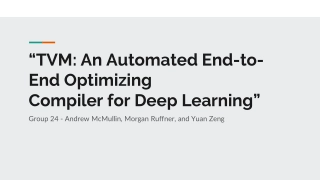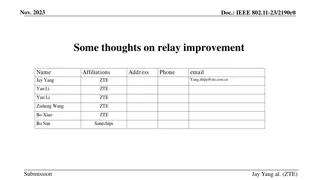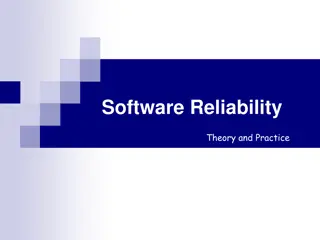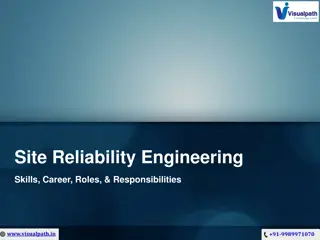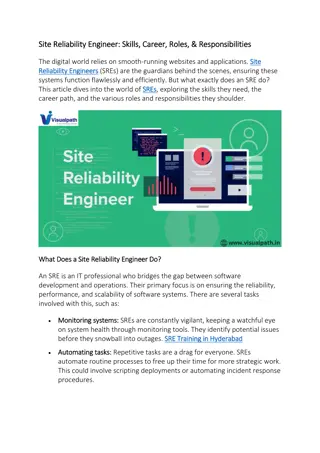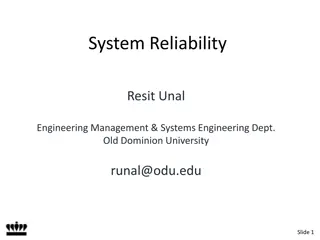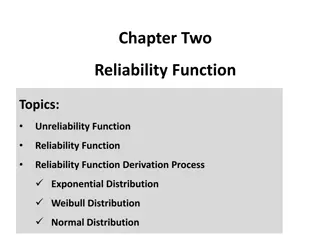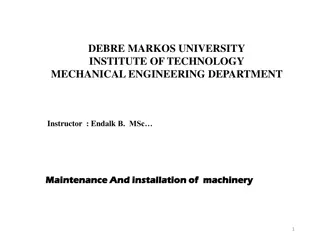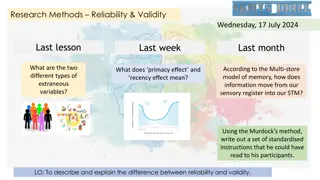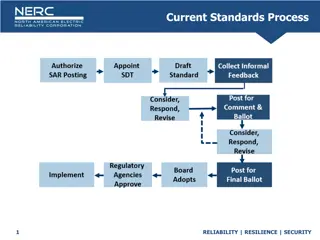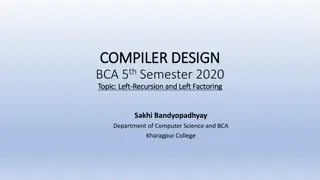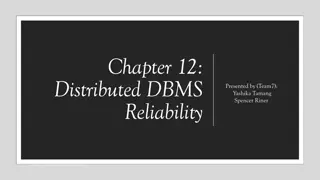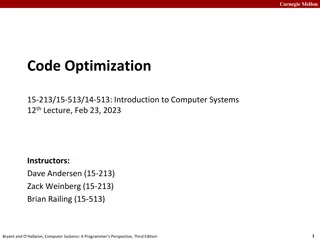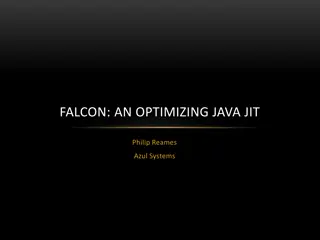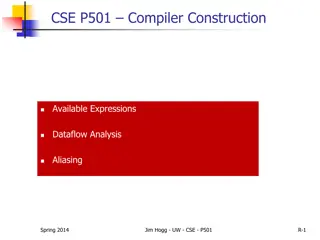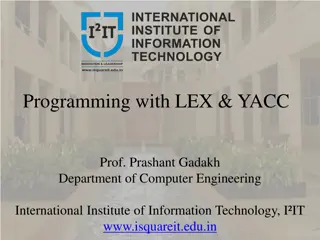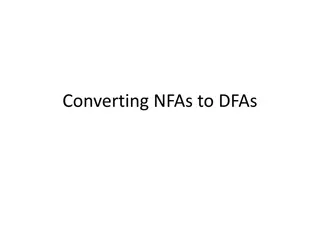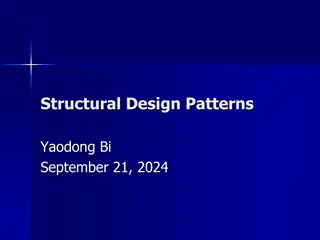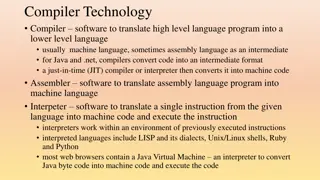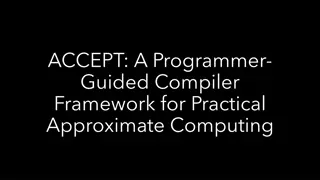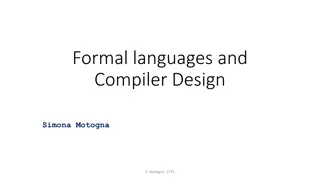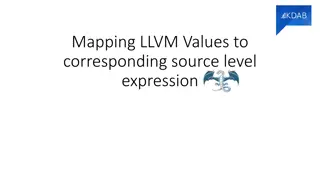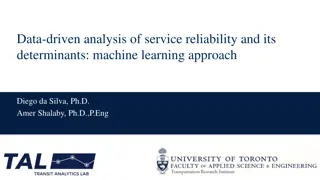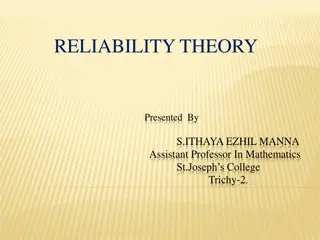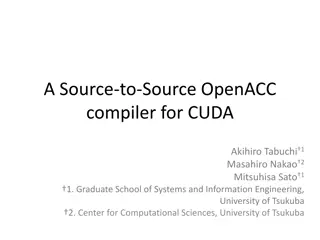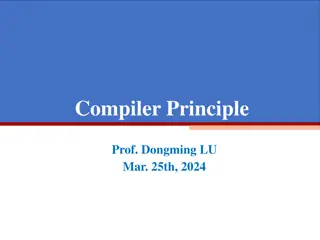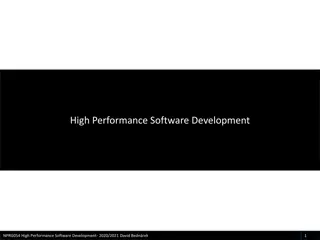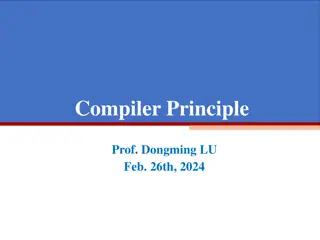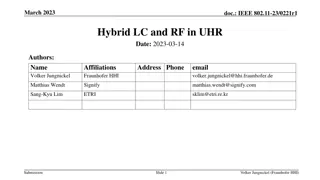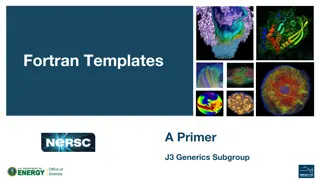TVM: An Automated End-to-End Optimizing Compiler for Deep Learning
TVM is a compiler that generates optimized code for diverse hardware back-ends from high-level specifications of deep learning programs, addressing the challenges of diverse hardware characteristics.
6 views • 16 slides
Software Engineering and Architecture
Reliability in software systems is crucial, as defects can lead to failures impacting reliability. The number of defects directly affects the system's reliability. Not all defects are equal, so prioritizing defect correction based on return on investment is essential. Testing thoroughly, especially
1 views • 40 slides
Enhancing Wi-Fi Relay Networks for Improved Coverage and Reliability
This document discusses the need to enhance relay frameworks in Wi-Fi networks to improve coverage, reliability, and performance of stations in different ranges. It highlights the challenges of S1G-based relays, proposes enhancements to the relay framework, and introduces new types of relay framewor
1 views • 12 slides
Understanding Software Reliability Metrics
Software reliability is a vital aspect of system quality, ensuring that systems behave as expected and operate without frequent failures. Key concepts include fault, failure, and different time intervals like MTTF, MTTR, and MTBF. By measuring and understanding these metrics, we can assess the relia
1 views • 21 slides
DRRS Design to Meet HB1500 Intent
DRRS design aims to meet the requirements of HB1500 in determining the quantity of services needed for reliability standards in ERCOT grid operations. The primary goal is to ensure operational reliability during extreme events with a focus on dispatchable generation facilities. DRRS resources must b
0 views • 6 slides
Site Reliability Engineering Online Training | Hyderabad
Visualpath offers an effective Site Reliability Engineering Online Training Program. To schedule a free demo, simply reach out to us at 91-9989971070.\nVisit \/\/ \/site-reliability-engineering-sre-online-training-hyderabad.html\nWhatsApp: \/\/ \/catalog\/919989971070\/\n
0 views • 9 slides
Site Reliability Engineering Training Institute in Hyderabad - SRE
Visualpath provides the best SRE Training Course in Hyderabad by real-time experts we are providing a Site Reliability Engineering Course that is available globally in India, the USA, the UK, Canada, Dubai, and Australia To book a demo, please get in touch with us at 91-9989971070.\nVisit \/\/ \/si
2 views • 3 slides
Understanding System Reliability in Engineering
System Reliability in Science/Engineering involves understanding how products/systems work, as well as the ways they fail and the effects of failures. Reliability is the probability that a system will perform as expected under given conditions and play a crucial role in the design phase to mitigate
0 views • 19 slides
Understanding Reliability Functions in Data Analysis
Reliability functions play a crucial role in data analysis, providing insights into the probability of success or failure over time. This chapter delves into topics like unreliability functions, derivation processes for reliability functions using distributions like exponential, Weibull, and normal.
0 views • 19 slides
Understanding Reliability in Mechanical Engineering
Reliability in mechanical engineering pertains to the ability of a product to perform as expected over a specified period under defined operational conditions. This article delves into the factors influencing reliability, such as numerical value, intended function, product life, and operating condit
0 views • 61 slides
Reliability and Failure Analysis in Engineering Systems
Introduction to failure data analysis, goodness of fit testing, stress-strength modeling, and reliability evaluation in engineering systems. Learn about failure rate estimation, MTBF/MTTF calculations, and practical examples illustrating reliability metrics in industrial applications.
0 views • 27 slides
Understanding Research Methods: Reliability and Validity in Psychological Studies
In psychological research, understanding reliability and validity is crucial. Reliability refers to consistency in measurements, while validity focuses on whether the results accurately represent the phenomenon being studied. Ensuring both reliability and validity enhances the credibility of researc
0 views • 13 slides
Current Standards Process for Reliability, Resilience, and Security
The current standards process focuses on ensuring reliability, resilience, and security in regulatory directives. It involves remanding standards to committees, convening technical conferences, re-ballingoting within 45 days, and considering input for further work. The process also covers the initia
1 views • 8 slides
Understanding Left Recursion and Left Factoring in Compiler Design
Left recursion and left factoring are key concepts in compiler design to optimize parsing. Left recursion can be problematic for top-down parsers and needs to be eliminated using specific techniques. Left factoring is a method to resolve ambiguity in grammars with common prefixes, making them suitab
0 views • 15 slides
Distributed DBMS Reliability Overview
This chapter delves into the critical aspect of reliability in distributed database management systems (DBMS). It explores the concepts, measures, types of faults, and the significance of maintaining atomicity and durability properties of transactions in ensuring system reliability. The narrative hi
0 views • 51 slides
Evolution of Compiler Optimization Techniques at Carnegie Mellon
Explore the rich history of compiler optimization techniques at Carnegie Mellon University, from the early days of machine code programming to the development of high-level languages like FORTRAN. Learn about key figures such as Grace Hopper, John Backus, and Fran Allen who revolutionized the field
0 views • 49 slides
Falcon: An Optimizing Java JIT Compiler Overview
Explore Falcon, an LLVM-based just-in-time compiler for Java bytecode developed by Azul Systems. Learn why using LLVM to build a JIT compiler is beneficial, address common objections, and dive into the technical and process lessons learned through its development timeline.
0 views • 66 slides
Enhancing Chapel Compiler with Interfaces and Semantic Changes
Explore the evolution of Chapel compiler with the integration of interfaces, semantic modifications, and improvements in error messages. Delve into the concepts of constrained generics, function call hijacking prevention, and the impact on compiler efficiency.
0 views • 30 slides
Ensuring Equivalence in Compiler Optimization Programs
Explore the challenges of proving equivalence in compiler optimization programs, validate refactorings, and analyze the trustworthiness of compilers through binary equivalence testing. Learn about handling loops, utilizing decision procedures, and running tests to confirm program behavior.
0 views • 24 slides
Dataflow Analysis for Available Expressions in Compiler Construction
Utilizing dataflow analysis techniques, the concept of available expressions is discussed in the context of compiler construction. The goal is to identify common subexpressions that span basic blocks by calculating their availability at the beginning of each block. The process involves determining w
0 views • 59 slides
Introduction to Lex and Yacc: Compiler Design Essentials
Lex and Yacc are essential tools in compiler design. Lex serves as a lexical analyzer, converting source code to tokens, while Yacc is a parser generator that implements parsing based on BNF grammars. Through these tools, strings are processed, and code is generated for efficient compilation. This i
0 views • 10 slides
NERC Operating Committee Update & Strategic Plan Overview
The NERC Operating Committee (OC) oversees critical operational reliability matters within the electricity sector, aligning with the organization's strategic plan for the next five years. Led by Chair Jim Case and Vice-chair Lloyd Linke, the OC collaborates with various stakeholders, focusing on eme
0 views • 15 slides
Compiler Data Structures and NFA to DFA Conversion
Compiler data structures play a crucial role in the compilation process, handling lexical analysis to code generation. Understanding the conversion from non-deterministic finite automata (NFA) to deterministic finite automata (DFA) is essential for efficient language processing and optimization.
0 views • 10 slides
Understanding Façade Design Pattern in Structural Design Patterns
Façade design pattern simplifies the interface of a complex system by providing a unified and straightforward interface for clients to access the system's functionalities. It helps in isolating the clients from the complexities of underlying components, offering a more user-friendly experience. The
0 views • 48 slides
Overview of Compiler Technology and Related Terminology
Compiler technology involves software that translates high-level language programs into lower-level languages, such as machine or assembly language. It also covers decompilers, assemblers, interpreters, linkers, loaders, language rewriters, and preprocessing steps used in compilation. Understanding
0 views • 29 slides
ACCEPT: A Programmer-Guided Compiler Framework for Practical Approximate Computing
ACCEPT is an Approximate C Compiler framework that allows programmers to designate which parts of the code can be approximated for energy and performance trade-offs. It automatically determines the best approximation parameters, identifies safe approximation areas, and can utilize FPGA for hardware
0 views • 15 slides
Overview of Java Programming Language
Java is a versatile and powerful programming language created by James Gosling and others at Sun Microsystems in the 1990s. It aims for portability, reliability, safety, simplicity, and efficiency. With a strong focus on object-oriented programming, Java has evolved over the years with a rich histor
0 views • 33 slides
Formal Languages and Compiler Design by Simona Motogna - Overview
This content provides an in-depth look into the course "Formal Languages and Compiler Design" by Simona Motogna. Covering topics such as compiler design, organization issues, history of programming languages, structure of a compiler, scanning techniques, and more. It also delves into the components
0 views • 18 slides
Understanding Compiler Optimizations in LLVM: Challenges and Solutions
Compiler optimizations in LLVM, such as loop vectorization, are crucial for enhancing program performance. However, understanding and addressing optimization challenges, like backward dependencies, can be complex. This article explores how LLVM values map to corresponding source-level expressions an
0 views • 41 slides
IEEE 2018 Emerging Technologies Reliability Roundtable Summary
The IEEE 2018 Emerging Technologies Reliability Roundtable took place in Austin, Texas, featuring speakers from various technology companies discussing topics such as software reliability, 5G network challenges, and ultra-reliability in wireless communication. The agenda included insightful talks, Q
0 views • 11 slides
ACE RAM Workshop - Barcelona 2019: Reliability and Maintenance Concepts
The ACE RAM Workshop conducted by George Pruteanu in Barcelona focused on topics such as RAM prediction, FMEA, maintenance concepts, preventive and predictive maintenance, condition monitoring systems, corrective maintenance, and design for maintenance. The workshop delved into reliability predictio
0 views • 16 slides
Machine Learning Approach for Analyzing Service Reliability Factors in São Paulo Transit Data
Explore how machine learning methods are applied to analyze São Paulo transit data, focusing on factors affecting bus service reliability measures. The study delves into quantifying and identifying relevant factors impacting service reliability across different levels such as stops, routes, and the
0 views • 10 slides
Understanding Reliability Theory in Engineering and Mathematics
Reliability theory, presented by S. Ithaya Ezhil Manna, explains the concept of reliability as the probability of a component functioning properly over time. The theory defines reliability in terms of the random variable X representing component life or time to failure. Key points include the defini
0 views • 22 slides
OpenACC Compiler for CUDA: A Source-to-Source Implementation
An open-source OpenACC compiler designed for NVIDIA GPUs using a source-to-source approach allows for detailed machine-specific optimizations through the mature CUDA compiler. The compiler targets C as the language and leverages the CUDA API, facilitating the generation of executable files.
0 views • 28 slides
Overview of Compiler Principle - Prof. Dongming LU
Introduction to compiler principles with a focus on lexical analysis, parsing, abstract syntax, semantic analysis, activation records, translating into intermediate code, and other key aspects related to bindings in the Tiger compiler. The content covers topics like semantic analysis, name spaces, t
0 views • 21 slides
High Performance Software Development - Topics and Related Lectures
This course on High Performance Software Development covers various topics such as modern programming styles, CPU properties, performance tuning, compiler optimization, memory hierarchy, and more. It also emphasizes the importance of using vector instructions within C/C++ for parallel programming. T
0 views • 10 slides
Compiler Principle by Prof. Dongming LU: Overview and Phases
Compiler Principle course explores the translation of programming languages into executable code using techniques, data structures, and algorithms. The course covers modules, interfaces, and phases of a typical compiler, emphasizing the importance of abstract syntax and intermediate code. Key concep
0 views • 37 slides
Integration of Light Communications for Enhanced Reliability in Multilink Operations
The presentation discusses the integration of Light Communications (LC) into the Multilink Operation (MLO) framework to enhance reliability and reduce latency in wireless communications. By proposing the incorporation of LC as a new offloading opportunity within the MLO framework, the potential for
0 views • 15 slides
Understanding Fortran Templates and Compiler-Driven Design Goals
Delve into the world of Fortran templates through a primer on generics, showcasing design goals set by the compiler. Explore syntax examples and motivating examples such as the AXPY subroutine, offering insight into the self-consistent nature of templates and their flexibility in parameter combinati
0 views • 9 slides
Understanding Reliability Measures in Research Supervised by Dr. Mohammed Mahdi Sharifi
Reliability is crucial for assessing the consistency of metrics in research. Various methods such as inter-rater reliability, test-retest reliability, parallel forms reliability, and internal consistency reliability help ensure the dependability of research findings. By examining factors like judgme
0 views • 9 slides
